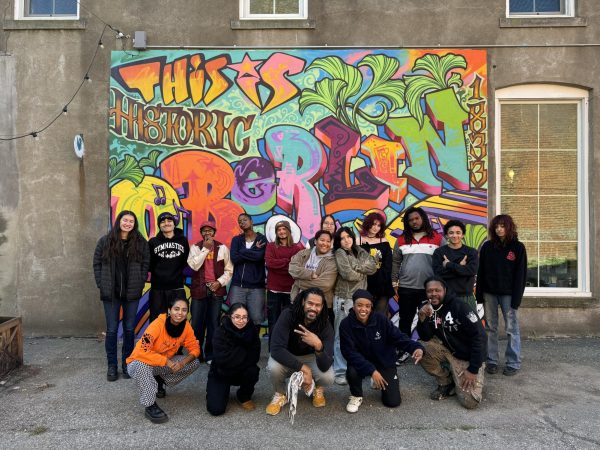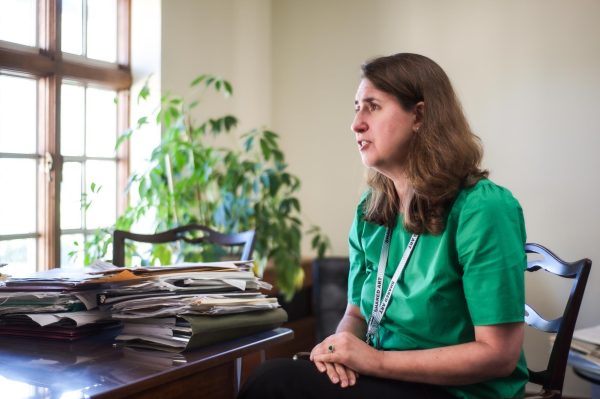Young Jazz Visionary Performs Original Compositions
New York-based saxophonist Immanuel Wilkins attracted a sizeable audience Saturday, Oct. 13 for his performance at David H. Stull Recital Hall, kicking off Oberlin’s midterm week. Wilkins’ quartet — featuring Micah Thomas on piano, Daryl Johns on bass, and Kweku Sumbry on drums — performed a complete set of original compositions written by the saxophonist.
Wilkins is currently a senior at The Juilliard School of Music, and his performances are in high demand. He’s a sideman to contemporary New York City jazz visionaries like Harish Raghavan, Gerald Clayton, Joel Ross, and David Weiss, and performs with his quartet of music school colleagues and other young innovators.
Wilkins’ progressive, gospel-inspired compositions push the boundaries of contemporary improvised music while still remaining grounded in the jazz canon. Wilkins is a talented composer who cites influences like Coleman and Bach. His lyrical, hymn-like music induces an intense cathartic response in his audiences.
Wilkins’ melodies aren’t bound to just one time signature; the emotional context or weight of the phrases are what determine the meter. As a result, Wilkins’ pieces contain complex sections with two or three different time signatures — all reflecting the poignancy of his phrases. Wilkins elaborated on his compositional approach in a masterclass the next day.
“When you play a phrase, figure out where it is [in the overall narrative],” he said. “There are certain phrases that lead you into something else, or that bring you from somewhere else.”
His songwriting strategies may seem complicated and abstract in theory, but the rhythm section’s support revealed the intuitive logic behind his pieces.
Sumbry and Johns’ bass-drum lockup punctuated the soaring themes of the pieces, which were filled in by Thomas’ lush textural landscapes at the piano. The rhythm section’s cohesive intention in their accompaniment of Wilkins’ melodic narrative has a poignancy reminiscent of film scores, which Wilkins said influence his style.
“I like to use specific compositional techniques that make the audience literally feel something at a point in the song,” Wilkins explained. “Like, how can I induce this particular emotion through what I write? How can I make the audience cry here? I like to think of it like a movie score — you want to cry when the main theme comes back at the end of the movie, but fully fleshed out and orchestrated. By then, that theme has been floating around your head for most of the movie.”
Wilkins’ storyteller-like approach to composition shone through during the performance and certainly transmitted its desired effect to the listeners. The crowd’s rapt attention transformed into an atmosphere of emotional intimacy. Conservatory senior Birsa Chatterjee, who also helms Oberlin Jazz Society — the student-booking organization responsible for bringing Wilkins to Oberlin — recalled one especially powerful moment of the performance.
“There was one moment at the end of the suite he wrote, where the melody kept coming back and it would get more and more intense every time,” Chatterjee said. “There was one peak where I could feel the energy in the room and it made a really big emotional impact.”
“I felt this immediacy of emotion — everything in the present was intense and completely authentic,” said Conservatory sophomore Will Curry after the show. “There was no dressing up of it.”
The band’s young age makes them more relatable to Oberlin students. Chaterjee saw this as one of the most crucial reasons to bring them to campus.
“One of the reasons why I brought them here is because they’re all our age,” he said. “I think we can use that as an inspiration to step up our game and push ourselves further. It’s important to recognize how much we can learn from each other, because even here [at Oberlin], I feel like I learn most from my peers.”
Wilkins’ intentionality is evident in his conceptual approach to performing and songwriting.
“It’s like the audience becomes a part of the work, you know what I mean?” Wilkins said. He spoke about moments in which he’s trying to transmit a specific type of energy to the audience.
“It’s more of a performance art type of thing, and it becomes a question of how is each audience going to react differently,” he said. “It’s usually a positive thing — you feel like a weight has been lifted. We’re trying to shift the atmosphere of the room and set it on fire.”
Wilkins’ raw vulnerability and unique compositional voice have set him and his bandmates on the path toward acclaim. We’ll definitely be hearing more from them as they continue to redefine edges and push boundaries.







